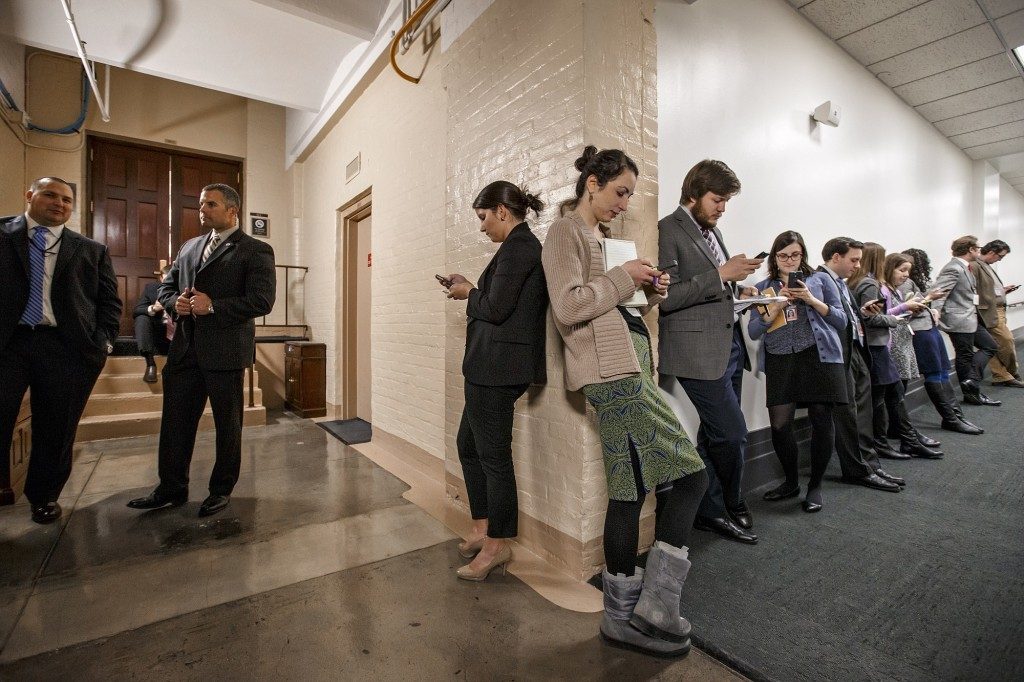
We sit and wait again on a healthcare vote, and likely until after the market closes. In the meantime we’ll get some important economic data today with the release of durable goods and the Markit measure of US manufacturing. Specifically on the capital spending side, there is the possibility of allowing immediate expensing of depreciation in order to encourage investment now (even though it doesn’t change cash flows) in any new tax reform. Thus, will companies anticipate this and change their behavior in 2017 or will they wait until a bill gets passed and then respond, even if it doesn’t come until 2018? The point is, policy delay has the potential to freeze corporate investment decisions and it is why the House is trying to move as quickly as it is to get tax reform done in 2017. That border adjustment tax possibility though remains the most controversial component and if you think changing the healthcare law was complex, just you wait.
Markit’s Japanese manufacturing index for March fell to 52.6 from 53.3 which was the best level since 2014. While down m/o/m, the pace of growth is still pretty good and Markit estimates that it fits with a 2% manufacturing output pace. They also said “new order books remain in solid growth territory…However, this comes at a the cost of ongoing marked rises in purchase costs: input price inflation remained close to a 2 yr high in March.” This has been a consistent theme throughout the world in the manufacturing indices. The yen is down slightly right now but was even weaker during market hours in Japan (traded near 111.50 vs 111.05 now) which in turn helped lift the Nikkei by almost 1%. JGB yields are little changed. Japan’s recovery remains very uneven but the industrial side right now is outperforming the consumer side.
The economic data continues to improve in Europe as Markit’s manufacturing and services composite index rose to 56.7 from 56 last month and that was 1 pt above the forecast. France was a particular standout as its index rose to 57.6 from 55.9 with included a 2 pt gain in services to the highest level in almost 6 years. Germany’s composite index also improved to a 70 month high. The employment component for the region touched almost a 10 yr high. New orders and backlogs rose at the quickest pace since April 2011 and Markit said it was “broad based.” This also led to a rise in the key inflation components where “both service sector and manufacturing input costs and selling prices were found to have been rising at the steepest rates since the first half of 2011 during Q1.” This is noteworthy because input prices were at the highest since May 2011 with the weak euro being the main reason but also there was “some evidence of rising wage growth and supply chain price pressures was also seen.” Markit estimates Q1 GDP growth for the region of .6% q/o/q which equates to almost 2.5% annualized.
Bottom line, what a pleasure it is to see the French economy join others in generating growth and there are no political worries here. I’ll tie this back to the ECB though because while they have begun the exit with the end of the TLTRO offers and the soon to be trim to QE, they are dangerously over doing it with their easing (especially with negative rates) which means only messiness ahead as they further remove themselves. Bond yields have only one way to go, particularly on the short end where trillions of bonds still have negative yields. In response to the Markit data and the noted cost and price pressures, the 5 yr 5 yr euro inflation swap is higher by 3 bps to 1.65% but that comes after the decline of 5 bps on Wednesday with the general market selloff. There was little market response elsewhere as European bourses are lower, the euro is little changed above $1.08 and European sovereign bonds are mixed.
It’s not just us who has an ultra dove such as Neel Kashkari in their central bank, the Bank of England has one too. His name is Gertjan Vlieghe and while he expects consumer price inflation to head to 3% he still believes a .25% benchmark rate is the right rate now. “I’d like to wait and get a little bit more information on the state of consumer and investment demand.” Really? The Times in London that interviewed him said “he would need to see evidence of strong wage growth before he would consider voting for a rate rise.” So, until the wage gains comes and if they do at all, UK consumers will suffer from the dramatic reduction in the purchasing power of their currency because of central bank thoughts such as this. The pound is back below $1.25 in response to the comments.
Quietly, Chinese interest rates continue heading higher with 3 month Shibor up 10 bps on the week and higher for 8 straight days. The Chinese are trying to straddle the line of wanting to encourage deleveraging at the same time allowing excessive credit growth needed to generate 6.5% GDP. Quite the conundrum, quite the potential mess. But at least they acknowledge the problem and are allowing bankruptcies to accelerate. Cleanse the system but it won’t be pretty.
 Peter is the Chief Investment Officer at Bleakley Advisory Group and is a CNBC contributor. Each day The Boock Report provides summaries and commentary on the macro data and news that matter, with analysis of what it all means and how it fits together.
Peter is the Chief Investment Officer at Bleakley Advisory Group and is a CNBC contributor. Each day The Boock Report provides summaries and commentary on the macro data and news that matter, with analysis of what it all means and how it fits together.